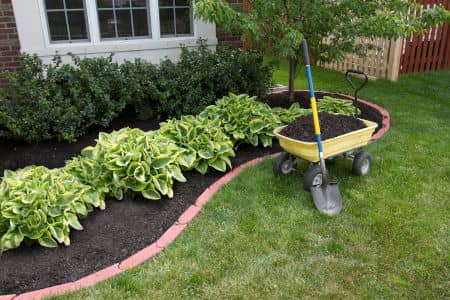Mulch Types Explained: Choosing the Best Option for Your Lawn and Garden

Mulch is an essential component of any well-maintained lawn or garden. It helps retain moisture, regulate soil temperature, suppress weeds, and add visual appeal to your landscape. However, with so many options available, choosing the right mulch for professional mulch installation can be overwhelming. In this guide, we'll break down the two main categories—organic and inorganic mulch—so you can select the best option for your yard's needs.
Organic Mulch
Organic mulch is made from natural materials that decompose over time, enriching the soil with nutrients. Common types include wood chips, bark, straw, grass clippings, and compost.
Pros:
- Improves soil health: As it breaks down, organic mulch adds valuable nutrients to the soil, promoting healthier plants.
- Environmentally friendly: Organic materials are sustainable and biodegradable, making them an eco-friendly choice.
- Aesthetic appeal: Wood chips and bark create a natural, polished look that complements gardens and landscaped spaces.
Cons:
- Needs regular replacement: Organic mulch decomposes, requiring periodic refreshing to maintain its effectiveness and appearance.
- Attracts pests: Certain types, like straw or grass clippings, can attract insects or rodents if not properly maintained.
- Can retain excess moisture: If applied too thickly, organic mulch may hold too much water, leading to root rot.
Inorganic Mulch
Inorganic mulch is made from non-decomposing materials like gravel, rubber, or landscape fabric. It is often used for decorative purposes or in areas where long-term coverage is desired.
Pros:
- Long-lasting: Unlike organic mulch, inorganic options don't break down, meaning they require little to no replacement.
- Low maintenance: Inorganic mulch is resistant to pests and weeds, making it a practical choice for low-maintenance landscapes.
- Durability: Materials like gravel or rubber are ideal for areas with heavy foot traffic or harsh weather conditions.
Cons:
- No soil enrichment: Inorganic mulch does not decompose, so it doesn't improve soil health.
- Higher upfront cost: Initial installation costs can be higher compared to organic mulch.
- Heat retention: Some inorganic materials, like rubber, can retain heat, potentially harming plants in hot climates.
Which Mulch Is Best for Your Yard?
Choose organic mulch if you're looking to improve soil health and prefer a natural aesthetic. Opt for inorganic mulch if you need durable, low-maintenance coverage for pathways, play areas, or heavily trafficked spaces.
At Anderson Lawn Care, we help homeowners select and install the perfect mulch to enhance their lawn and garden. We're the local Overland Park lawn care specialists to choose for jobs like this. Contact us for expert advice and professional mulch installation in Overland Park!
Get A Free Estimate Today!
Trustworthy Lawn and Yard Maintenance Services in Overland Park Contact Our Lawn Services Today!